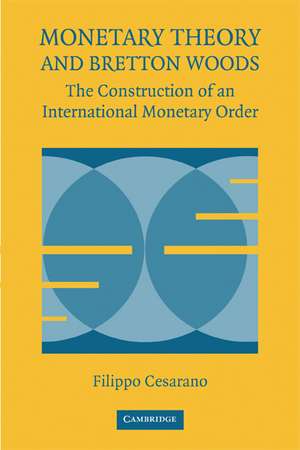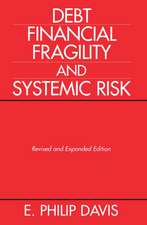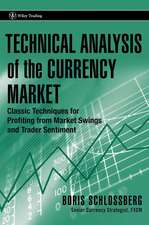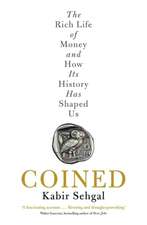Monetary Theory and Bretton Woods: The Construction of an International Monetary Order: Historical Perspectives on Modern Economics
Autor Filippo Cesaranoen Limba Engleză Paperback – 9 noi 2008
| Toate formatele și edițiile | Preț | Express |
|---|---|---|
| Paperback (1) | 259.95 lei 6-8 săpt. | |
| Cambridge University Press – 9 noi 2008 | 259.95 lei 6-8 săpt. | |
| Hardback (1) | 739.46 lei 6-8 săpt. | |
| Cambridge University Press – 3 sep 2006 | 739.46 lei 6-8 săpt. |
Din seria Historical Perspectives on Modern Economics
-
 Preț: 322.86 lei
Preț: 322.86 lei -
 Preț: 200.09 lei
Preț: 200.09 lei -
 Preț: 277.57 lei
Preț: 277.57 lei -
 Preț: 307.58 lei
Preț: 307.58 lei -
 Preț: 288.62 lei
Preț: 288.62 lei -
 Preț: 277.65 lei
Preț: 277.65 lei -
 Preț: 430.14 lei
Preț: 430.14 lei -
 Preț: 350.91 lei
Preț: 350.91 lei - 11%
 Preț: 536.98 lei
Preț: 536.98 lei -
 Preț: 289.19 lei
Preț: 289.19 lei -
 Preț: 400.76 lei
Preț: 400.76 lei -
 Preț: 323.27 lei
Preț: 323.27 lei - 11%
 Preț: 577.27 lei
Preț: 577.27 lei -
 Preț: 331.09 lei
Preț: 331.09 lei -
 Preț: 357.37 lei
Preț: 357.37 lei -
 Preț: 395.17 lei
Preț: 395.17 lei -
 Preț: 286.69 lei
Preț: 286.69 lei - 14%
 Preț: 787.78 lei
Preț: 787.78 lei -
 Preț: 364.08 lei
Preț: 364.08 lei -
 Preț: 357.91 lei
Preț: 357.91 lei -
 Preț: 355.54 lei
Preț: 355.54 lei -
 Preț: 321.90 lei
Preț: 321.90 lei -
 Preț: 441.58 lei
Preț: 441.58 lei -
 Preț: 272.75 lei
Preț: 272.75 lei -
 Preț: 442.22 lei
Preț: 442.22 lei -
 Preț: 414.74 lei
Preț: 414.74 lei - 14%
 Preț: 728.05 lei
Preț: 728.05 lei -
 Preț: 266.98 lei
Preț: 266.98 lei -
 Preț: 392.82 lei
Preț: 392.82 lei -
 Preț: 309.49 lei
Preț: 309.49 lei
Preț: 259.95 lei
Nou
Puncte Express: 390
Preț estimativ în valută:
49.75€ • 51.75$ • 41.07£
49.75€ • 51.75$ • 41.07£
Carte tipărită la comandă
Livrare economică 14-28 aprilie
Preluare comenzi: 021 569.72.76
Specificații
ISBN-13: 9780521739092
ISBN-10: 0521739098
Pagini: 264
Dimensiuni: 150 x 221 x 20 mm
Greutate: 0.36 kg
Ediția:1
Editura: Cambridge University Press
Colecția Cambridge University Press
Seria Historical Perspectives on Modern Economics
Locul publicării:New York, United States
ISBN-10: 0521739098
Pagini: 264
Dimensiuni: 150 x 221 x 20 mm
Greutate: 0.36 kg
Ediția:1
Editura: Cambridge University Press
Colecția Cambridge University Press
Seria Historical Perspectives on Modern Economics
Locul publicării:New York, United States
Cuprins
1. Introduction; 2. International monetary equilibrium and the properties of the gold standard; 3. The international monetary system between the world wars; 4. The monetary system in economic analysis: the critique of the gold standard; 5. The Great Depression: overturning the state of the art; 6. Providing for a new monetary order; 7. The Bretton Woods Agreements; 8. Bretton Woods and after.
Recenzii
'Filippo Cesarano has written a masterful survey of the literature on the evolution of the global regime from the classical gold standard to the present era of fiat money. The book is a must-read for any serious scholar of the international monetary system. His careful interweave of economic history, the history of economic doctrine, and modern monetary theory reveals the importance of the principles of monetary theory for the successes and failures of the sequence of monetary regimes from the pre-1914 gold standard, to the gold exchange standard, to Bretton Woods, and to the present penchant for monetary unions.' Michael Bordo, Rutgers University
'Cesarano has written a splendid book. As a long-run economic explanation for the origins, life, and collapse of Bretton Woods, it is difficult to see how it could be bettered.' Forrest Capie, Economic History Review
'Monetary Theory and Bretton Woods shows conclusively that the evolution of monetary doctrines is best understood if studied in the light of the challenges of policy making in a complex interdependent world. The result is a fascinating account that skillfully combines the history of monetary theory with the history of the international monetary system.' Marc Flandreau, Institut d'Etudes Politiques de Paris
'In a bold extension of a more familiar economic logic, Filippo Cesarano argues that theoretical thinking is a central, even decisive, part of what shapes society's economic institutions. Cesarano's book stands out for the novelty and importance of his core argument as well as the force with which he combines the history of ideas and the history of events to support it.' Benjamin Friedman, Harvard University
'This study deserves the attention not just of the intellectual historian but also of any practically minded reader who is seeking a deeper understanding of today's international monetary system.' David Laidler, University of Western Ontario
'… Cesarano rediscovers and distils the ideas of dozens of economists.' Journal of European Economic History
'Cesarano has written a splendid book. As a long-run economic explanation for the origins, life, and collapse of Bretton Woods, it is difficult to see how it could be bettered.' Forrest Capie, Economic History Review
'Monetary Theory and Bretton Woods shows conclusively that the evolution of monetary doctrines is best understood if studied in the light of the challenges of policy making in a complex interdependent world. The result is a fascinating account that skillfully combines the history of monetary theory with the history of the international monetary system.' Marc Flandreau, Institut d'Etudes Politiques de Paris
'In a bold extension of a more familiar economic logic, Filippo Cesarano argues that theoretical thinking is a central, even decisive, part of what shapes society's economic institutions. Cesarano's book stands out for the novelty and importance of his core argument as well as the force with which he combines the history of ideas and the history of events to support it.' Benjamin Friedman, Harvard University
'This study deserves the attention not just of the intellectual historian but also of any practically minded reader who is seeking a deeper understanding of today's international monetary system.' David Laidler, University of Western Ontario
'… Cesarano rediscovers and distils the ideas of dozens of economists.' Journal of European Economic History
Notă biografică
Descriere
This book argues that advances in monetary theory played a decisive role in the Bretton Woods Agreements of July 1944.













